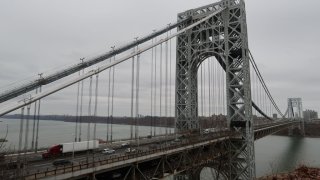
A view from Fort Lee Historic Park, which overlooks the George Washington Bridge on the Hudson River between New York and New Jersey states, during an Autumn day in New York, United States on November 22, 2020. (Photo by Islam Dogru/Anadolu Agency via Getty Images)
The busy George Washington Bridge connecting New Jersey and New York City will go cashless next month after the new electronic tolling system installed over the last few months is activated.
The Port Authority of New York and New Jersey announced Thursday that the electronic tolling system will be activated on July 10.
“Cashless transactions are no longer a thing of the future in this age of touchless financial transactions, and for non-E-ZPass customers that convenience of modern life has now come to our 90-year-old George Washington Bridge,” said Port Authority Chairman Kevin O’Toole. “We are extremely pleased with the activation of this best-in-class, all-electronic technology that will assure quick, accurate, electronic toll billing at the GWB.”
Watch NBC 4 free wherever you are
The cashless system works by capturing images of license plates to allow for toll payment by mail for non-E-ZPass customers. This process will get rid of cash toll collection, eliminating traffic at toll booths. Toll booths and islands will also be eliminated.
“This new cashless toll collection system is part of the Port Authority’s multi-faceted push to renew, upgrade or rehabilitate every aspect of our crossings so that these legacy structures are able to adapt to the changing needs of the traveling public and incorporate best-in-class technology,” said Port Authority Executive Director Rick Cotton.
Get Tri-state area news delivered to your inbox with NBC New York's News Headlines newsletter.
The tollbooths on the bridge’s upper level were at the center of 2013′s “Bridgegate” scandal when political operatives realigned traffic lanes to create gridlock near the bridge to punish a local mayor who didn’t support then-New Jersey Gov. Chris Christie.
Christie wasn’t charged but two former aides were convicted in federal court and one pleaded guilty. Their convictions later were thrown out by the U.S. Supreme Court.
News
The bridge is the busiest of the crossings operated by the Port Authority of New York and New Jersey and handled roughly 49 million eastbound vehicles last year. In addition to serving as an entry point for commuters into New York City, it carries millions of vehicles annually traveling on Interstate 95.
The Port Authority already implemented all-electronic tolling at its three Staten Island bridges in 2019 and at the Holland Tunnel in 2020.
According to Port Authority, because the new electronic system cannot determine the number of passengers in a vehicle, the carpool discount plan will also end at the bridge once the system rolls out.
A cashless toll system at the Lincoln Tunnel, the remaining Hudson River crossing, will come to fruition by the end of 2022.



